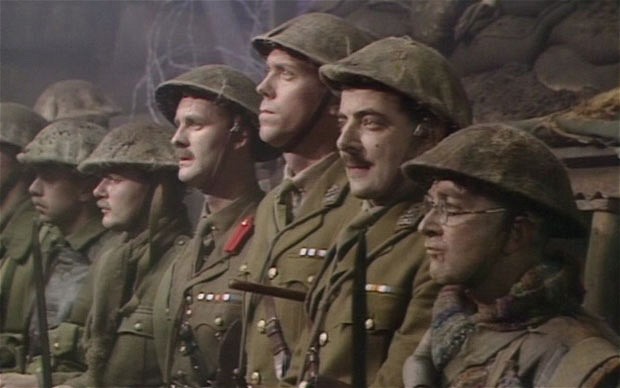Baldrick: “What I want to know, Sir, is, before there was a Euro there were lots of different types of money that different people used. And now there’s only one type of money that people use. And what I want to know is, how did we get from one state of affairs to the other state of affairs.”
Blackadder: “Baldrick. Do you mean, how did the Euro start?”
Baldrick: “Yes Sir.”
Blackadder: “Well, you see Baldrick, back in the 1980s there were many different countries all running their own finances and using different types of money. On one side you had the major economies of France, Belgium,Holland and Germany, and on the other, the weaker nations of Spain, Greece, Ireland, Italy and Portugal. They got together and decided that it would be much easier for everyone if they could all use the same money, have one Central Bank, and belong to one large club where everyone would be happy. This meant that there could never be a situation whereby financial meltdown would lead to social unrest, mass unemployment and crises.”
Baldrick: “But this is sort of a crisis, isn’t it Sir?”
Blackadder: “That’s right Baldrick. You see, there was only one slight flaw with the plan.”
Baldrick: “What was that then, Sir?”
Blackadder: “It was bollocks.”
This dialogue adapted from Blackadder, currently doing the rounds of the internet, is the simplest and probably the most sensible explanation of the financial crisis ever. If there’s one thing that economists agree on, it’s that they all disagree on the causes and the solutions.
This much is clear : the plan was flawed right from the start.
Once you decide to have a customs union, and an economic union, you either go the whole way or not at all.
The founding fathers of Europe – and I purposely use this word rather than “European Union” – had a political vision. Somewhere down the road, it was diverted, diluted and debased into a sort of super market union, a “common market”.
But there was no common vision. So the European Economic Community (an unfortunate but apt name), which then became the European Union (political? if only) ambled peaceably along, riven by opposing visions, but held together by layers of bureaucracy and wrappings of red tape. Discussion, rather than action, became the order of the day.
Now this may have been all right for a generation which could still remember the horrors of the Second World War, grateful that at least the enemies of yesteryear were now sitting around the same table. And those were the heady days of European economic reconstruction, when the Western World and Europe had a natural advantage over the Third World, as it was known back then. Governments could spend and expand the welfare state, safe in the knowledge that economic growth would pay for any debt they incurred.
But history has a way of undoing the best-laid plans. A series of events sapped Europe of its confidence: the oil crisis, the increasing gap between government income and expenditure, the population explosion and the meteoric rise of the developing world, which now demands an equal say in world affairs.
Without a common political vision, Europe foundered in a mire of self-doubt, hostage to its own ideals of the universality of human rights, peace and global prosperity.
Talk of silver linings is cheap, so I shall desist. But there if there’s one good thing that has come out of the crisis it’s this: it has made us Europeans question the European Project. The strategic political vision is back in the arena, being debated and, it is hoped, hammered out.
Because the only way in which we can emerge from the crisis is by thinking strategically.
For all the differences between member states, we are all in the same boat. This is not member states against each other, but Europe vs The Rest of the World. Most European leaders ignore, or pretend to ignore, the real cause of the economic crisis and unemployment: an economy bled dry by deindustrialisation, and by negative prospects of sales on the domestic market. Who would want to invest in R&D or equipment, or hire more employees, if the chances of recouping the expenditure through sales are almost nil?
In the Eurozone, we have a common coin but not a common currency. In the European Union, we have a common market but not a common economic strategy.
Blackadder is right. The original plan was bollocks. Now is the time to come up with a new one and strike back. And to aim for nothing less than the New European Century.

Leave a Reply